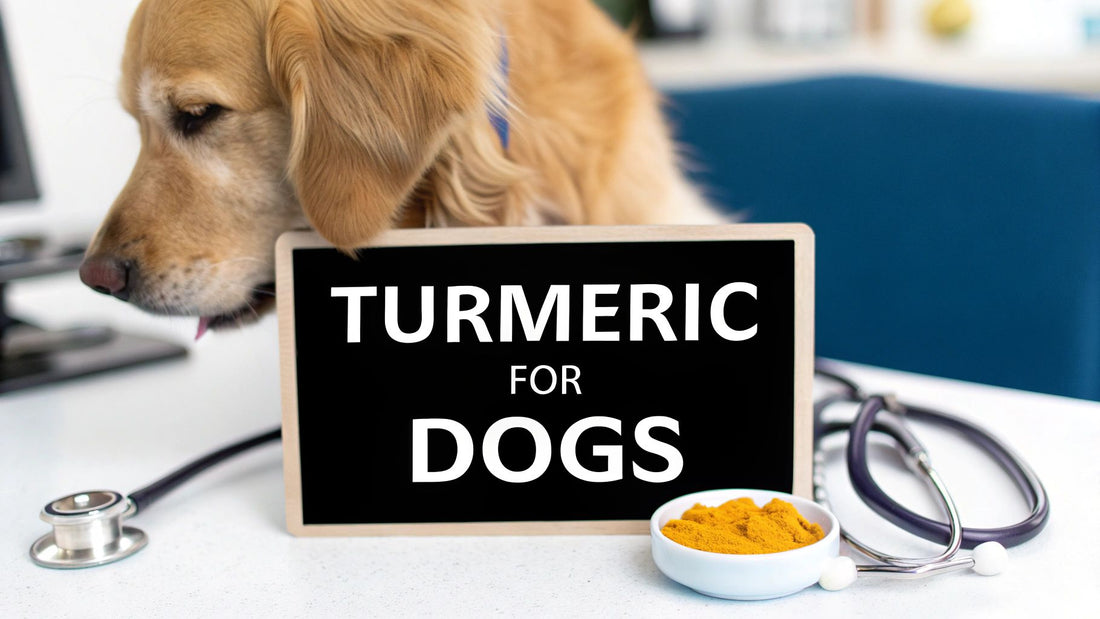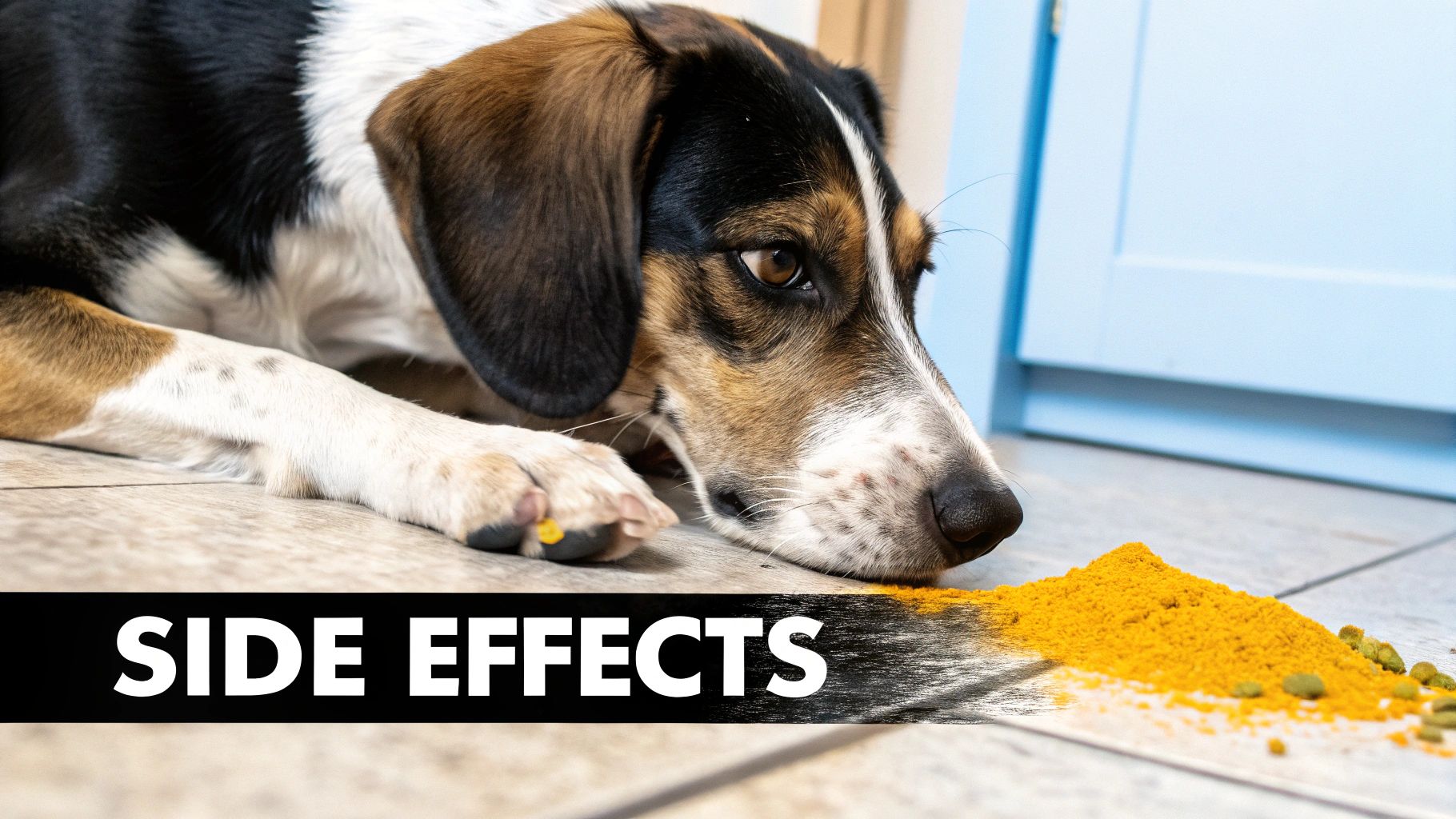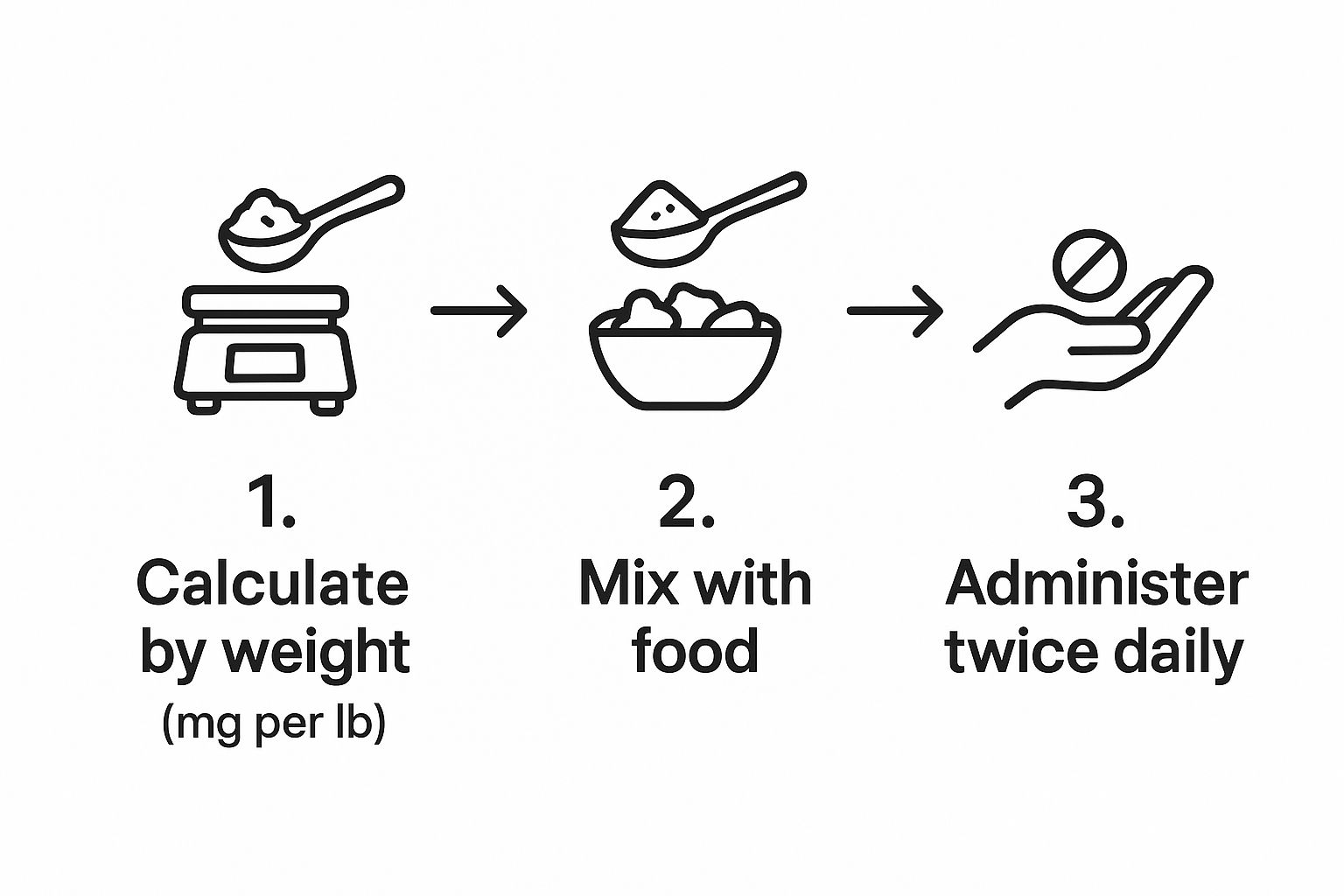
Can Dogs Eat Turmeric? A Vet-Approved Guide
Yes, dogs can absolutely eat turmeric. In fact, you've probably heard it celebrated for its powerful anti-inflammatory benefits, and for good reason.
But hold on—it's not quite as simple as grabbing the spice jar from your kitchen and shaking it over their dinner. For turmeric to be both safe and effective for your dog, proper preparation and a green light from your vet are non-negotiable.
The Simple Answer to Turmeric for Dogs
So, you've heard the buzz about turmeric and you're wondering, "Is this a safe, natural option for my best friend?" The short answer is yes, when given correctly, it can be a fantastic addition to your dog's wellness plan. The real magic behind turmeric lies in its active compound, curcumin.
Think of it like this: turmeric is the entire plant, but curcumin is the superstar ingredient doing all the heavy lifting. This one compound is responsible for nearly all of the health-boosting properties we're after. Understanding that difference is the first step to using it the right way.
Turmeric for Dogs at a Glance
To cut to the chase, let's break down the most important facts you need to know about giving turmeric to your dog.
This quick summary table covers the main benefits and the most crucial considerations you need to be aware of before starting.
| Aspect | Key Information |
|---|---|
| Primary Benefit | Natural anti-inflammatory properties, often used to support joint health in dogs with arthritis. |
| Active Compound | Curcumin is the potent antioxidant that delivers the therapeutic effects. |
| Is it Safe? | Generally safe in appropriate, small doses, but it must be prepared correctly to aid absorption. |
| Preparation | Raw turmeric powder is poorly absorbed. It's often mixed into a "golden paste" with a healthy fat and black pepper. |
| First Step | Always consult your veterinarian before adding any new supplement to your dog’s diet. |
Getting the key points in one place helps, right? Now you have a solid foundation for what comes next.
The most important thing to remember is that while turmeric is natural, it's still a potent supplement. Your vet is your best resource for figuring out a safe dosage, checking for potential interactions with other medications, and confirming if it's even the right choice for your dog's specific health needs.
With this initial overview, we can now dig deeper into exactly how turmeric works, what it can do for your dog, and—most importantly—how to prepare and dose it safely. The goal here is to give you the confidence to make a smart, informed decision for your pet, with professional guidance leading the way.
What Makes Turmeric a Super Spice for Dogs

When we talk about what makes turmeric so special, we’re really talking about its star player: curcumin. You can think of turmeric as the delivery vehicle, but curcumin is the powerful compound inside that does all the heavy lifting.
This is a really important point because the amount of curcumin in the turmeric sitting in your spice rack is surprisingly low—typically just 2% to 5%. That's why a light sprinkle on your dog’s dinner, while tasty, isn't going to deliver any real therapeutic benefits. To get those powerful health effects, you need a much more concentrated dose.
Curcumin belongs to a family of compounds called curcuminoids, which have been valued for their natural anti-inflammatory and antioxidant properties for centuries. They’re the reason this golden spice can be a fantastic, safe addition to your dog’s wellness routine.
The Science Behind the Spice
So, what’s actually happening inside your dog’s body? Curcumin works at a cellular level to help dial down inflammation. Think of it like a dimmer switch for the body's inflammatory response, which can go into overdrive with conditions like arthritis or after an injury.
It gently interferes with the specific pathways and enzymes that trigger swelling and pain. This offers a more natural way to soothe discomfort, often without the side effects that can come with conventional pain medications. That's precisely why it's become so popular for dogs with stiff, achy joints.
Curcumin pulls double duty. As an anti-inflammatory, it helps manage existing discomfort. As an antioxidant, it protects cells from future damage caused by rogue molecules called free radicals.
The Bioavailability Challenge
But here’s the catch. On its own, curcumin is notoriously difficult for the body to absorb. Scientists call this low bioavailability, which simply means that very little of it actually makes it into the bloodstream where it can get to work.
Giving your dog plain turmeric powder is a bit like trying to fill a bucket that’s full of holes; most of the good stuff never reaches its destination. This absorption issue is the single biggest hurdle to overcome.
It's why preparing turmeric correctly isn't just a helpful tip—it's essential. To unlock its full potential, curcumin needs a little help from a few key ingredients, which we'll get into next. Without that boost, you’re just not going to see the results you’re hoping for.
What Turmeric Can Really Do For Your Dog

Now that we know the magic behind turmeric lies in its active compound, curcumin, let’s get into the practical, real-world ways this golden spice can help your furry friend. The most well-known and researched benefit is, without a doubt, its incredible ability to ease the discomfort that comes with joint issues like osteoarthritis.
Imagine inflammation as a small, smoldering fire inside your dog’s joints, making them stiff, achy, and sore. Curcumin acts like a natural firefighter, dialing down that inflammatory response right at the source. For many dogs, this translates into visibly better mobility—they might have an easier time getting up from their bed, seem more enthusiastic about walks, and generally live with less pain.
A Natural Ally For Aching Joints
For any dog slowing down due to osteoarthritis, turmeric can be a gentle but powerful ally. Its anti-inflammatory effects aren't just a theory; they've been seen time and again in clinical studies. One controlled study, for instance, found that dogs who received a turmeric-supplemented diet showed a significant drop in pain levels.
In fact, vets observed over a 30% decrease in pain when handling the joints of dogs getting turmeric. That’s a huge deal for their day-to-day comfort and quality of life. This kind of research is why turmeric is becoming such a respected tool for managing joint health.
It’s an especially great option to complement a traditional treatment plan, particularly for senior dogs who might be more sensitive to standard medications. It gives us, as pet owners, one more way to help manage their chronic discomfort safely.
Beyond The Joints: A Whole-Body Boost
While joint support often steals the spotlight, curcumin's benefits don't stop there. Its antioxidant properties are a game-changer for your dog’s overall health, working to shield their body from the inside out.
Think of antioxidants as tiny bodyguards for your dog's cells. They go around neutralizing unstable molecules called free radicals, which are a major cause of aging and chronic disease.
By fighting off this "oxidative stress," turmeric helps maintain a strong immune system and promotes better health long-term.
We've put together a quick overview of the main ways turmeric can support your dog's well-being.
Potential Health Benefits of Turmeric for Dogs
A breakdown of the primary health advantages supported by scientific evidence.
| Health Benefit | How Turmeric Helps | Primary Condition Addressed |
|---|---|---|
| Anti-Inflammatory | Curcumin inhibits inflammatory pathways in the body. | Arthritis, joint pain, and stiffness. |
| Antioxidant Power | Neutralizes free radicals, reducing cellular damage. | Chronic diseases and signs of aging. |
| Digestive Aid | Can stimulate bile production to help digest fats. | Poor digestion and nutrient absorption. |
| Skin Soother | Its anti-inflammatory properties can calm skin irritation. | Itchiness, allergies, and hot spots. |
| Organ Support | Helps protect the heart and brain from oxidative stress. | Age-related cognitive and cardiac decline. |
As you can see, the benefits are wide-ranging. From calming irritated skin to supporting a healthy gut, this spice packs a serious wellness punch.
All of this helps answer the big question: "Can dogs eat turmeric?" The answer is about so much more than just easing achy joints; it’s about offering holistic support for a happier, healthier life. Our guide on why turmeric is good for dogs dives even deeper into these benefits. When used correctly, you're not just giving them a supplement—you're supporting their wellness from head to tail.
How to Prepare Turmeric for Your Dog
So, you're ready to give this golden spice a try? It's a great idea, but it's not quite as simple as grabbing the shaker from your spice rack and sprinkling it over your dog's dinner. To really get the benefits of turmeric, it has to be prepared in a specific way that unlocks its full potential.
The main challenge we need to overcome is something called bioavailability. Think of it this way: the powerhouse compound in turmeric, curcumin, is a bit stubborn. On its own, a dog's body has a really tough time absorbing it. Most of it just passes right through their system without ever getting into the bloodstream where it can do its work. To make it count, we need to give it a little help.
The Secret to "Golden Paste"
The most popular and effective way to serve turmeric is by whipping up a simple recipe called "golden paste." This isn't just a gimmick; it's a smart combination of three ingredients that work together to dramatically increase how much curcumin your dog can actually use.
Here’s the simple, vet-approved formula:
- Turmeric Powder: You’ll want to start with a high-quality, organic turmeric powder. Steer clear of curry powders or spice blends, as they often contain ingredients that are toxic to dogs, like onion or garlic.
- A Healthy Fat: Curcumin is fat-soluble, which means it needs fat to dissolve, not water. Mixing it with a good oil—like coconut or olive oil—is crucial for helping it pass through the gut wall and into the bloodstream.
- Black Pepper: This is the real magic ingredient. Freshly ground black pepper contains a compound called piperine, and it’s a total game-changer. Piperine can boost curcumin's bioavailability by an incredible 2,000%, making it an absolutely essential part of the recipe.
The bottom line is that making a golden paste is key to unlocking turmeric's power. Without a fat source and a pinch of black pepper, you're essentially wasting the supplement, since very little of the good stuff will ever be absorbed by your dog.
Proper Dosing for Your Dog
Once your golden paste is ready, the next critical step is figuring out the right dose. With any new supplement, the golden rule is always to start low and go slow. This gives your dog's digestive system time to adjust and allows you to keep an eye out for any potential issues.
As a general guideline, you'll want to begin with a tiny amount and build up gradually. Curcumin is widely regarded as a natural anti-inflammatory, and a common recommendation is around 15mg to 20mg of turmeric per pound of your dog's body weight each day. This usually translates to about 1/8 to 1/4 teaspoon of golden paste for every 10 pounds your dog weighs.
The infographic below breaks down a simple and safe way to administer it.

As you can see, the process starts with a simple calculation based on weight and ends with consistent, twice-a-day doses mixed right into their food. This routine can be particularly helpful for dogs dealing with joint stiffness or discomfort. If you're looking for more ways to support their mobility, check out our guide on dog treats for arthritis.
Just remember, always start with a fraction of the full dose and slowly increase it over the course of a week or two.
Understanding the Risks and Side Effects

While the buzz around turmeric is exciting, it's important to remember this isn't just another food topping. It’s a powerful, biologically active compound. And like anything potent, it comes with potential downsides and isn't the right choice for every dog.
Being a responsible pet owner means looking at the full picture—the good and the bad—before adding something new to your dog's bowl.
The most common complaints we see are tummy troubles. Give too much too soon, and you might be dealing with an upset stomach, diarrhea, or even vomiting. This is exactly why the "start low and go slow" approach is so critical. It gives your dog's system time to adjust.
When Turmeric Should Be Avoided
For some dogs, turmeric is simply a no-go due to their health history. Its natural properties, which are beneficial for many, can actually complicate certain pre-existing conditions. It's crucial to know if your dog fits into any of these categories.
You should steer clear of turmeric if your dog has been diagnosed with:
- Gallbladder Problems: Turmeric stimulates bile production, which can spell trouble for a dog with gallbladder stones or a bile duct obstruction.
- A History of Kidney Stones: The spice is naturally high in oxalates, compounds that can contribute to the formation of kidney stones in susceptible pups.
- Iron Deficiency: Turmeric can slightly hinder the body's ability to absorb iron. If your dog is already anemic, this could make the problem worse.
- Diabetes: It can naturally lower blood sugar. For a dog already on medication to manage glucose, this could lead to dangerously low levels.
One of the most critical things to know about turmeric is its blood-thinning effect. It's a natural anticoagulant. You must stop giving it to your dog at least two weeks before any scheduled surgery to prevent the risk of excessive bleeding.
Potential Medication Interactions
Beyond specific health conditions, you also have to consider what other medications your dog is taking. Because turmeric has its own anti-inflammatory and blood-thinning properties, it can essentially "double up" the effects of prescription drugs that do the same thing.
Think about it this way: if your vet has your dog on an NSAID (a non-steroidal anti-inflammatory drug) for arthritis, adding turmeric could amplify the medication's effects, increasing the risk of side effects like stomach ulcers. The same goes for blood-thinning drugs.
This is why having a conversation with your veterinarian isn't just a suggestion—it's non-negotiable. They know your dog's full health profile and can give you the green light, ensuring you're helping, not harming.
Why Your Vet's Opinion Matters Most
When you're exploring the world of pet supplements, it can feel like you're trying to navigate a maze. But there's one golden rule that cuts through all the noise: your veterinarian's guidance is absolutely essential. Before you even think about adding a pinch of turmeric to your dog’s food, scheduling a chat with your vet is the single most important step you can take.
Think of your vet as the one person who holds the complete story of your dog's health. They know every chapter—from past illnesses and sensitivities to the current medications they're taking. This deep, personal knowledge is what allows them to say with confidence whether turmeric is a good idea for your dog, not just any dog.
A Personalized Safety Check
A vet consultation isn't just about getting a simple "yes" or "no." It's a comprehensive, personalized safety check to make sure a new supplement won't cause more harm than good.
Here’s what your vet will look at:
- Medication Interactions: They'll review your dog's current prescriptions, like NSAIDs for arthritis or common blood thinners, to ensure turmeric won’t cause a negative reaction.
- Underlying Health Conditions: Your vet knows if your dog has any conditions, such as gallbladder or kidney issues, that could be made worse by turmeric.
- A Precise, Safe Dosage: Based on your dog’s specific weight, age, and overall health, your vet can calculate the right starting dose. No guesswork involved.
A professional consultation takes the uncertainty out of the equation. It turns a well-intentioned idea into a safe, strategic part of your dog's wellness plan, ensuring you're actually helping them.
Ultimately, your vet is your partner in your dog's health. They help you walk the fine line between a beneficial natural supplement and a potential risk, always aiming for the best possible outcome.
This collaborative approach is what keeps your dog safe. It’s just as crucial as picking from the healthiest treats for dogs for their daily routine. By working together, you can make choices that truly support a long, vibrant life for your furry family member.
Common Questions About Turmeric for Dogs
Even after getting the facts straight, you probably still have a few lingering questions. It's completely normal! Let's tackle some of the most common queries I hear from pet owners to make sure you're feeling confident.
Can I Just Use Turmeric Powder From My Kitchen?
Yes, you can absolutely use the plain, organic turmeric powder sitting in your spice rack, but there's a big catch. You can never just sprinkle it on their food. For your dog to actually absorb the good stuff (the curcumin), it has to be mixed into a "golden paste" with a healthy fat and some black pepper.
And be extra careful not to grab a spice blend by mistake. Things like curry powder often contain ingredients that are toxic to dogs, like onion or garlic powder. Always stick to pure, 100% turmeric.
How Long Does It Take to Work?
This is where patience really comes into play. Turmeric is a natural supplement, not a quick-fix pharmaceutical. It can take several weeks of consistent daily use before you start seeing a real difference in your dog's mobility, skin health, or overall comfort.
Think of it like starting a new fitness routine. You don't see major changes after one trip to the gym. The benefits build up slowly over time with steady commitment.
Just stick to the dosage your vet recommended and keep an eye on how your dog is doing.
What About Those Pre-Made Turmeric Chews and Supplements?
You'll find a lot of great turmeric supplements out there made just for dogs, often in the form of tasty chews or treats. The big advantage here is that they're already formulated for proper absorption and easy dosing, which takes all the guesswork out of making your own paste.
The key is to be a savvy shopper. Always flip the package over and read the ingredient list to check for quality and make sure it's not loaded with junk fillers. Your best move is to snap a picture of the product and run it by your vet before you start giving it to your dog.
It's smart to be cautious with anything new you add to your dog's diet. Beyond supplements, many people wonder about what other foods dogs can or cannot eat, and it's always wise to check with an expert first.
At Joyfull, we believe your pets deserve the best. Our formulas are made with clean ingredients and high-quality proteins, all backed by our in-house veterinary advisor. Explore our products at https://joyfullpet.com to support a healthful life for your furry family members.

